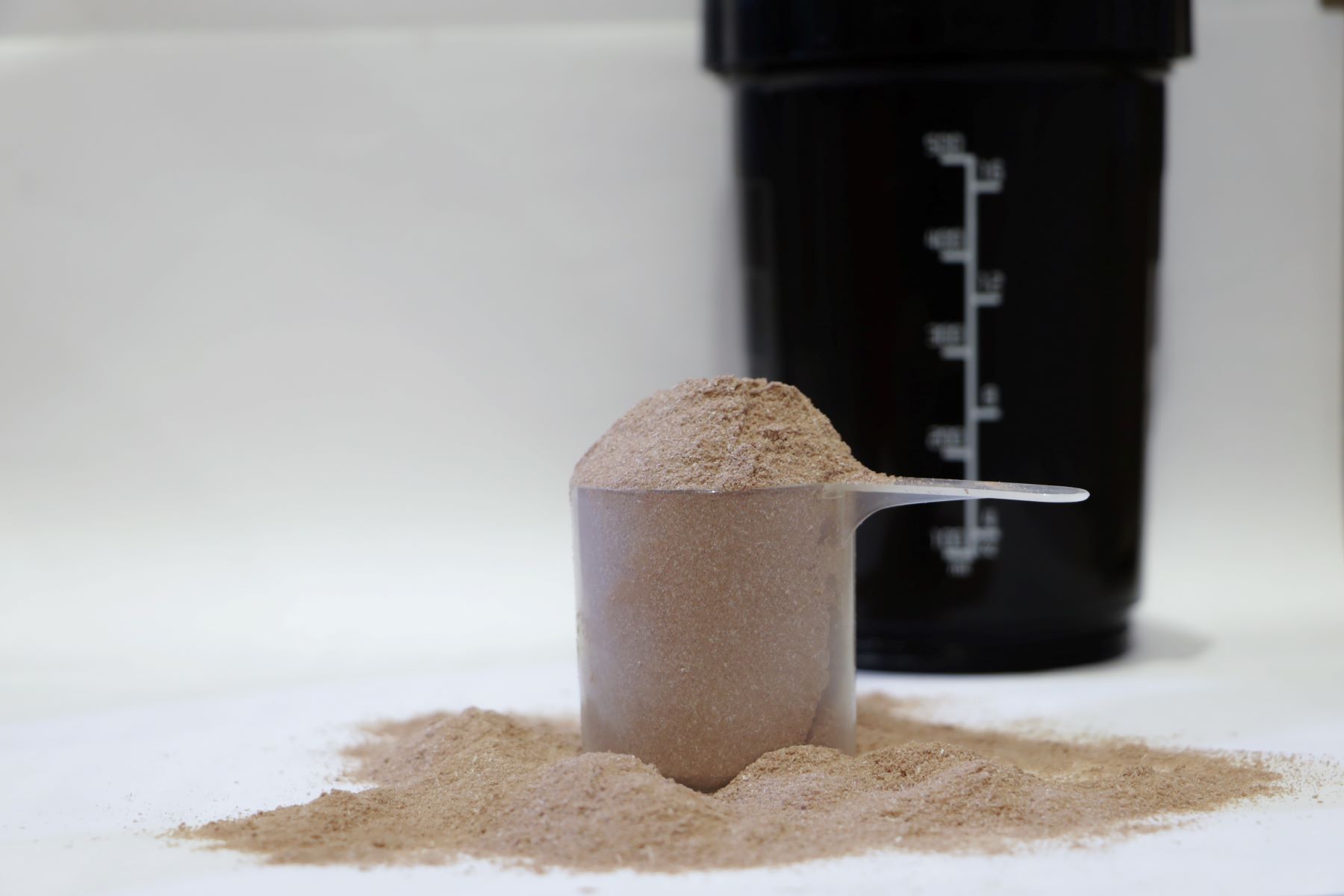Home>Misc>Featured>How Long Does It Take For Pre-Workout To Kick In


Featured
How Long Does It Take For Pre-Workout To Kick In
Modified: January 2, 2024
Discover the answer to "how long does it take for pre-workout to kick in" with our featured article. Learn when to expect the effects and optimize your workout routine.
Introduction
For fitness enthusiasts, getting the most out of their workout is a top priority. To achieve this, many turn to pre-workout supplements to boost their energy, endurance, and focus. But how long does it take for pre-workout to kick in? This question is often asked by individuals looking to optimize their workouts and make the most of their chosen supplement.
Pre-workout supplements have gained immense popularity in recent years. They are specially formulated to provide a variety of benefits, such as increased energy levels, improved mental focus, enhanced strength, and reduced muscle fatigue. These supplements typically contain a blend of ingredients such as caffeine, B vitamins, amino acids, and creatine, which work synergistically to help you perform at your best.
Understanding how pre-workout works and how long it takes to take effect is essential for maximizing its potential benefits. While individual experiences may vary, there are some general factors to consider that can influence the absorption and onset of the pre-workout supplement’s effects.
What is Pre-Workout?
Pre-workout refers to a type of dietary supplement designed to be taken before exercise to enhance performance. It is commonly used by athletes, bodybuilders, and fitness enthusiasts to improve their workout sessions. Pre-workout supplements are formulated with a combination of ingredients that provide a range of benefits, including increased energy, improved focus, and enhanced endurance.
The specific ingredients in pre-workout supplements can vary, but some common ones include caffeine, beta-alanine, creatine, and branched-chain amino acids (BCAAs). Each ingredient serves a different purpose and can contribute to the overall efficacy of the supplement.
Caffeine is often included in pre-workout supplements due to its stimulant effects. It can help increase alertness, improve focus, and reduce perceived exertion during exercise. Beta-alanine is known for its ability to buffer lactic acid, which can delay muscle fatigue and allow for longer and more intense workouts. Creatine, on the other hand, can increase muscle strength and power output. BCAAs are important for muscle recovery and can help reduce exercise-induced muscle damage.
Pre-workout supplements are available in various forms, including powdered drink mixes, capsules, and ready-to-drink formats. The most common method of consumption is to mix the powdered supplement with water and drink it approximately 20-30 minutes before starting the workout. However, it’s important to carefully follow the dosage instructions provided by the manufacturer and consult with a healthcare professional if needed.
It’s worth noting that while pre-workout supplements can be beneficial for enhancing performance, they should not be relied upon as a substitute for a balanced diet and proper training. Nutrition, rest, and regular exercise should always form the foundation of any fitness regimen.
How Pre-Workout Works
Pre-workout supplements are designed to provide a boost in energy, focus, and endurance during exercise. The combination of ingredients in pre-workout supplements works together to enhance various aspects of performance and help you achieve your fitness goals. Understanding how these supplements work can help you maximize their benefits and make informed choices when selecting a pre-workout product.
Caffeine, one of the primary ingredients in pre-workout supplements, acts as a central nervous system stimulant. It helps increase alertness and reduce the perception of effort during exercise. By stimulating the release of adrenaline and blocking the action of adenosine, caffeine provides a surge of energy and improves focus, allowing for a more intense and productive workout.
Beta-alanine is another important component of pre-workout supplements. It works by increasing levels of carnosine in the muscles, which acts as a buffer against acid build-up. This delay in muscle fatigue allows you to push through tough workouts, perform more repetitions, and maintain higher levels of intensity for a longer duration.
Creatine is a well-known ingredient in pre-workout supplements due to its ability to enhance strength and power output. It works by replenishing ATP (adenosine triphosphate) stores in the muscles, which are responsible for providing immediate energy during high-intensity exercise. By increasing the availability of ATP, creatine helps increase muscular strength and endurance, allowing you to lift heavier weights and perform explosive movements more effectively.
Branched-chain amino acids (BCAAs) are essential amino acids that play a crucial role in muscle recovery and repair. When consumed before exercise, BCAAs can help reduce muscle damage and minimize the breakdown of muscle tissue during intense workouts. This can lead to faster recovery and less muscle soreness post-exercise.
Other ingredients commonly found in pre-workout supplements, such as nitric oxide boosters and vitamins, also contribute to the overall effectiveness of the product. Nitric oxide boosters, such as citrulline and L-arginine, promote vasodilation, increasing blood flow to the muscles and enhancing nutrient and oxygen delivery. Vitamins, such as B vitamins, support energy metabolism and help convert food into usable energy for the body.
It’s important to note that individual responses to pre-workout supplements can vary. Factors such as body size, tolerance to stimulants, and overall sensitivity to the ingredients can influence how you experience the effects. Starting with a low dosage and gradually increasing it can help determine the optimal amount for your needs.
Factors Affecting Pre-Workout Absorption
The absorption and effectiveness of pre-workout supplements can be influenced by several factors. Understanding these factors can help you make the most of your pre-workout regimen and ensure optimal absorption of the supplement.
1. Timing: The timing of your pre-workout supplement consumption can greatly impact its absorption. It is generally recommended to take pre-workout supplements approximately 20-30 minutes before your workout. This allows enough time for the ingredients to be metabolized and reach peak levels in your bloodstream when you begin your exercise session.
2. Stomach Contents: The presence of food in your stomach can affect the absorption of pre-workout supplements. Taking them on an empty stomach allows for faster absorption since there are no other substances competing for absorption. However, some individuals may experience stomach discomfort when taking pre-workout supplements without food. Experimentation may be necessary to find the approach that works best for you.
3. Individual Physiology: Every individual’s body is unique, and factors such as metabolism, body weight, and sensitivity to ingredients can influence how quickly pre-workout supplements are absorbed and their effects are felt. Some individuals may experience faster absorption and a more immediate kick-in, while others may require a longer time to feel the effects. It’s important to pay attention to your body’s response and adjust your supplement intake accordingly.
4. Tolerance: Regular use of pre-workout supplements can lead to the development of tolerance over time. This means that your body may become less responsive to the same dosage, and you may need to increase the amount or cycle off the supplement periodically to maintain its effectiveness. Consulting with a healthcare professional can help guide you on proper usage to avoid building up tolerance.
5. Quality of the Supplement: The quality and formulation of the pre-workout supplement can also impact absorption. It’s important to choose a reputable brand that uses high-quality ingredients and follows good manufacturing practices. Reading reviews and doing research can help you select a supplement that is known for its effectiveness and reliability.
By considering these factors and making appropriate adjustments to your pre-workout routine, you can improve the absorption and overall effectiveness of the supplement. It’s important to listen to your body, follow recommended dosages, and monitor your tolerance levels to ensure a safe and beneficial experience.
How Long Does It Take for Pre-Workout to Kick In?
The time it takes for pre-workout to kick in can vary depending on various factors, including the formulation of the supplement, your individual metabolism, and how your body responds to the ingredients. While there is no exact timeframe that applies to everyone, there are some general guidelines to consider.
Most pre-workout supplements are designed to start taking effect within 20-30 minutes after consumption. This is why it is recommended to take the supplement approximately 20-30 minutes before your workout. During this time, the ingredients in the pre-workout supplement are metabolized and enter your bloodstream, reaching peak levels to deliver their intended benefits.
One of the key ingredients in pre-workout supplements is caffeine, a stimulant that can enhance energy and focus. For many individuals, the effects of caffeine can be felt within 15-30 minutes after consumption. You may experience a surge in energy, improved mental alertness, and increased motivation for your workout.
Other ingredients such as beta-alanine, creatine, and BCAAs may take a little longer to kick in. Beta-alanine, for example, needs time to be absorbed and increase carnosine levels in the muscles, which can take about 30-60 minutes. Creatine needs to be taken consistently over a period of time to build up in the muscles and provide its full benefits. BCAAs may start working within 30 minutes to an hour, helping with muscle recovery and reducing muscle breakdown during exercise.
It’s important to note that individual responses can vary. Some individuals may feel the effects of pre-workout sooner, while others may take longer to feel the full impact. Additionally, your tolerance to certain ingredients may also affect how quickly you feel the effects. For example, if you regularly consume caffeine or have a high tolerance for it, you may not feel the same energizing effects as someone who is more sensitive to caffeine.
Monitoring your body’s response and adjusting the timing and dosage of your pre-workout supplement can help you determine the optimal timing for maximum effectiveness. It’s also worth mentioning that the effects of pre-workout supplements typically last for a few hours, so timing your intake according to the duration of your workout can help ensure you reap the benefits throughout your training session.
Overall, understanding that pre-workout supplements take time to be absorbed and reach their peak levels in the bloodstream is important for timing your consumption properly. It may require some experimentation and listening to your body to find the ideal time and dosage that works best for you.
Tips for Maximizing Pre-Workout Effects
To get the most out of your pre-workout supplement and maximize its effects, here are some tips to consider:
1. Follow Recommended Dosage: It’s essential to carefully follow the dosage instructions provided by the manufacturer. Taking more than the recommended amount will not necessarily enhance the effects and may lead to unwanted side effects. Stick to the suggested dosage for optimal results.
2. Stay Hydrated: Pre-workout supplements can have a diuretic effect, so it’s important to stay hydrated. Drink enough water throughout the day and sip on water during your workout to maintain proper hydration levels.
3. Pair with a Balanced Diet: While pre-workout supplements can provide an energy boost, they should not be seen as a replacement for a well-balanced diet. Fuelling your body with nutritious foods will provide the necessary energy and nutrients for optimal performance during your workout.
4. Consider Timing: The timing of your pre-workout intake is crucial. Take the supplement approximately 20-30 minutes before your workout to allow the ingredients to be absorbed and reach peak levels in your system. This will ensure that you experience the desired effects when you hit the gym or start your training session.
5. Listen to Your Body: Pay attention to how your body reacts to the pre-workout supplement. If you experience any discomfort or negative side effects, consider adjusting the dosage or timing. Everyone’s tolerance and response are different, so finding what works best for you is key.
6. Cycle Off Regularly: Taking pre-workout supplements consistently for an extended period can lead to tolerance buildup. To avoid this, consider cycling off the supplement periodically. This means taking breaks from pre-workout usage to reset your body’s response and prevent diminishing effects.
7. Avoid Late-Night Consumption: Pre-workout supplements often contain stimulants like caffeine that can disrupt sleep patterns if taken too close to bedtime. To maintain a healthy sleep routine, avoid consuming pre-workout supplements within a few hours of going to bed.
8. Combine with Proper Training: While pre-workout supplements can provide an energy boost, it’s important to combine their use with a well-structured training program. Proper training techniques, progressive overload, and consistency will yield better results overall.
9. Consider Individual Sensitivities: Certain individuals may be more sensitive to certain ingredients found in pre-workout supplements, such as caffeine. If you know or suspect that you have sensitivities or allergies, look for supplements that are free from those specific ingredients or consult with a healthcare professional for guidance.
Remember, pre-workout supplements are meant to enhance and support your workouts, but they should not be relied upon as the sole factor for success. A balanced approach that includes proper nutrition, hydration, rest, and a well-designed training program is the key to achieving your fitness goals.
Potential Side Effects of Pre-Workout
While pre-workout supplements can be beneficial for many individuals, it’s important to be aware of the potential side effects that can arise from their use. The following are some common side effects associated with pre-workout supplements:
1. Gastrointestinal Issues: Some individuals may experience digestive discomfort when taking pre-workout supplements. This can include symptoms such as nausea, stomach cramps, bloating, or diarrhea. These side effects can be attributed to the ingredients present in the supplement or the use of excessive amounts.
2. Increased Heart Rate and Blood Pressure: Pre-workout supplements containing stimulants like caffeine can potentially increase heart rate and blood pressure. This can be concerning for individuals with underlying cardiovascular conditions or those who are sensitive to stimulants. It’s advisable to consult with a healthcare professional if you have any pre-existing heart conditions or concerns.
3. Sleep Disruptions: Pre-workout supplements often contain stimulants that can interfere with sleep patterns, especially if consumed too close to bedtime. Individuals may experience difficulty falling asleep or maintaining a restful sleep. To avoid sleep disruptions, it’s recommended to avoid taking pre-workout supplements within a few hours of sleep.
4. Dehydration: Some pre-workout supplements can have a diuretic effect, leading to increased urine production and potential dehydration. It’s crucial to stay hydrated and drink sufficient water throughout the day, especially when using pre-workout supplements.
5. Allergic Reactions: Certain individuals may be allergic to specific ingredients found in pre-workout supplements. Common allergens include artificial sweeteners, coloring agents, or other additives present in the supplement. It’s important to carefully read the label and consult with a healthcare professional if you have known allergies.
6. Dependency and Tolerance: Regular use of pre-workout supplements can lead to dependency and tolerance. This means that over time, you may require larger doses to achieve the same effects. To avoid this, it’s recommended to cycle off pre-workout supplements periodically and not rely solely on them for energy and performance.
7. Interaction with Medications: Pre-workout supplements can interact with certain medications, such as blood pressure medications or stimulant-based drugs. It’s crucial to consult with a healthcare professional if you are taking any medications to ensure there are no contraindications or adverse reactions when combining them with pre-workout supplements.
Please note that individual responses to pre-workout supplements can vary, and not everyone will experience these side effects. It’s important to monitor your body’s reaction and discontinue use if you experience any severe or concerning symptoms. It’s always advisable to read the label, follow recommended dosages, and consult with a healthcare professional before adding any new supplement to your routine.
Conclusion
Pre-workout supplements can be a valuable tool to enhance your workouts and improve your performance. They are formulated with a blend of ingredients that work together to provide increased energy, focus, and endurance during exercise. However, it’s important to understand how pre-workout supplements work and the factors that can influence their absorption and effectiveness.
Timing your pre-workout consumption, following recommended dosages, and considering individual factors such as tolerance and sensitivity to ingredients can help you make the most of your pre-workout supplement. It’s crucial to listen to your body and adjust your usage as needed to achieve optimal results without experiencing any adverse side effects.
It’s worth remembering that pre-workout supplements should complement a healthy lifestyle that includes a balanced diet, hydration, proper training, and rest. They should not be seen as a magic solution or a replacement for the fundamentals of wellness and exercise.
If you have any existing medical conditions or take medications, it’s important to consult with a healthcare professional before incorporating pre-workout supplements into your routine. They can provide personalized guidance based on your individual needs and help ensure that the supplement is safe and suitable for you.
Always choose reputable brands and read labels carefully to ensure the quality and safety of the pre-workout supplement. Keeping hydration levels in check, paying attention to your body’s response, and cycling off the supplement periodically can also contribute to a positive experience with pre-workout supplements.
In summary, pre-workout supplements can provide a valuable boost to your workouts, helping you achieve your fitness goals. By understanding how they work, considering key factors that affect their absorption, and following proper guidelines, you can maximize their effects and optimize your performance in the gym or during any physical activity.









